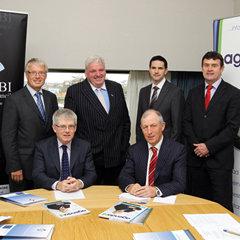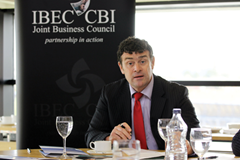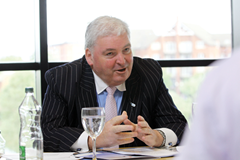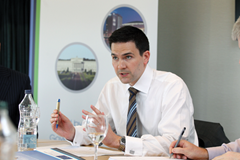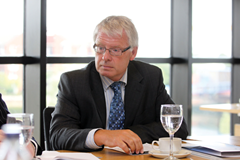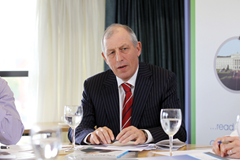All-island economy
Business leaders consider the future of the all-island economy and how Northern Ireland can learn from the Republic as it recovers.
How is the all-island economy faring?
In the UK in general and Northern Ireland in particular, there hasn’t been much good news recently. Consumer confidence is falling, bank lending into businesses has plummeted, the trade deficit has widened and inflation remains high. The challenge in Northern Ireland remains very significant.
If you look at the Republic of Ireland, exports have remained very high and in fact are growing. Obviously, the fiscal austerity measures are starting to bite so one of the challenges there is how you stimulate local economic development and growth.
Ireland, through very encouraging and direct action by the Irish Government, seems to be moving in the right direction. However, it is a huge challenge and obviously with the UK being a big market for the Republic and vice versa, those economies are interdependent. Much depends on how the UK economy emerges going forward as much as how the Irish economy responds.
Nigel Smyth
At a GB level, there’s a number of headwinds. On the island of Ireland, those are more like trade winds or gales. Credit conditions are remaining very tight and the Irish banking situation affects us across the island. You’ve a sluggish property market at a national level, whereas it’s a deeply depressed market across the island. The third area is around public expenditure constraint. Particularly in Northern Ireland, it’s a large part of our economy.
There have been a lot of positives, particularly at the start of the year. We saw a strong bounce-back in our manufacturing sector. Likewise in the South, you’ve seen very strong export performance. Again in Northern Ireland, renewable energy, ICT and agri-food are a number of positives.
In the ICT sector in Northern Ireland, there’s maybe 1,500 vacancies out there; probably their biggest challenge is getting the right skills to feed those vacancies.
It’s very much a mixed picture but on the Northern Ireland side, we do have a very difficult property market. It’s not just the construction sector. Anybody who was tied up in the boom times is still feeling the pain.
On an all-island perspective, the trends are very similar and it would be very easy to be gloomy. In the survey we do of 1,000 businesses four times a year across the economy, only 12 per cent of businesses are in growth mode. Forty- three per cent of businesses are stable but that leaves a very big proportion of businesses that are contracting or just fighting to survive at the minute.
Those businesses are primarily small micro-businesses focused on domestic demand. Medium-sized businesses in the export market are actually doing well and, from an Irish perspective, you’re looking at a current account surplus equivalent to 3-4 per cent of GDP in the next year.
There are fundamentals in place, particularly at the micro-level, that are very strong particularly in companies that are focused on export markets but there is a big rump of domestically-focused business that are giving real cause for concern. They’ve been hanging on for three to four years and I don’t think a lot of them can hang on for much longer.
What are the main challenges?
Feargal McCormack
In the context of the all-island economy, the white elephant in the room is Nama. The economy itself is suffering because people still believe the core markets like housing and property have not yet bottomed out.
Nama is not able yet to facilitate transactions to the level we would like them to do. People are reluctant to invest at present because they don’t know if it’s at the bottom. What I would be suggesting is that we get to the bottom immediately and then move on.
The smarter businesses have now moved on from transitional to transformational change. We’re seeing a lot of businesses making money now. A lot more companies have changed their business model. Those people aren’t yet spending in the island market. Once the confidence comes, that will be all we need to do.
David Manning
We’ve gone through this 18 to 24 month period of substantial austerity measures to try and get the economy back on track. There are certainly companies in difficulty but it has also driven innovation in the economy as well.
It was very useful to see the article in yesterday’s Financial Times,that Ireland is responding to the challenge that’s facing it, in order to turn itself around. Having that PR out there is very, very useful rather than lumping us in with the Spanish, Portuguese and Greece.
That confidence was never really lost in the export market.
You don’t want to kill the golden goose. There’s a tipping point and, probably at the moment, we’re just below the tipping point where we can absorb the amount of austerity that’s there while enabling the innovation and growth that’s needed. If we go beyond there, we’ll start to find ourselves in difficulty; additional measures will be counter-productive.
One of the key areas is going to be infrastructure delivery. The Irish Programme for Government talks about investment in energy, broadband and water infrastructure. Getting that backbone infrastructure for our economy in play will deliver the benefits down the road in attracting new industry into Ireland.
Feargal McCormack
Our greatest problem is that we haven’t yet moved away, in many cases, from the blame game. We need wise counsel in the media. I’m not aware of any case where looking back in anger and looking for retribution has paid off.
Aidan Gough
Business is not involved in the blame game. Business has moved on. What we’ve seen from the Business Monitor is that business reacted very quickly. They cut costs. They cut prices. They took other actions in regard to their own cost base and opening new markets.
More businesses now are looking at innovation and exports, across the border or off the island. Rising costs is now a key challenge for the economy and businesses, particularly energy costs.
In the South we’ve just announced a price increase. However, we take no pleasure in doing this.
As an economy, we’re 90 per cent import- dependent. The main factor is the increase in wholesale price, driven by what happened in Japan and decisions in Germany about nuclear, which is driving demand for gas.
How can we source our own indigenous energy? One is to harness our renewable energy source. The other one is projects like Corrib Gas. The persistent delay does not paint our economy in a particularly good light. We need to get beyond that continuous objection to projects that are obviously in the national interest.
What are the implications of Ireland’s recovery for Northern Ireland?
Feargal McCormack
The recovery of the Irish economy is very important to the North. For the smaller micro-businesses over the last 10-20 years, the island has become a single economy island. That level of business is looking at 5 million people, as opposed to 1.5 million in the North. Even though the tax regime is UK mainland-based, psychologically they seem to be doing a lot more business easier across the border.
An improvement in confidence in the South will have an immediate knock-on positive impact on the North, and it may bring back some employment in the construction sector.
Hugh Crossey
A major challenge is leadership. It’s easy to underestimate this. Public services on an all-island basis need a modernisation programme and it will require strong political leadership to deliver that. More of the same will not cut it; what is required is transformational change. Whether that involves embracing new methods of delivery, such as joint ventures, public-private partnerships, even potentially some privatisation, we need strong leadership from politicians.
Similarly, we need our private sector businesses to be more outward-looking. We have some companies that are focused on export markets but not nearly enough.
Nigel Smyth
A lot of businesses would expect Ireland to recover faster than Northern Ireland in spite of the much greater difficulties. I think that is down to political leadership.
Leadership is not about taking popular decisions. It is about taking the difficult decisions. It is about setting out the vision and making sure that the resources that you’re putting in are supporting that vision.
Now the record in Northern Ireland would not be particularly good at that, unfortunately, but we have to be looking ahead. There’s things we should be investing in and creating jobs for the future.
How do we rebalance the northern economy in terms of the private sector?
There’s good lessons to be learnt, certainly over the last 20 years, in terms of their economic strategies, their reports, their analysis. A real depth and quality to that research and then coming up with good strategies and effective implementation.
I think we would look with envy in terms of what they’ve done down there. They’ve been very good at allocating budgets accordingly, whether it’s regarding skills or R&D, on the back of that.
Over the last decade, the Northern Ireland Science Park has really established itself quite strongly, and the technology and ICT sector. Clearly a long way behind where the Republic is, and indeed we’ve significant challenges in the whole venture capital space.
Every economy is a small firms economy: 97.12 per cent of companies in Northern Ireland are small; 96.8 per cent of companies across England are small. The issue in Northern Ireland is we have a very small number of large companies. About 50 per cent smaller.
If we had the same percentage of large companies, our problems would be resolved. We need to stimulate and support those growth-orientated companies and understand that 6 per cent of the companies are likely to create 60 per cent of the jobs.
Those are likely to be innovative companies. They’re likely to be exporting. Rather than bland, blunt instruments, we should be trying to focus our efforts on supporting those companies who have the ambition to grow. We need more companies who have that ambition and indeed the leadership and management skills to take them there.
Feargal McCormack
We all acknowledge that Northern Ireland, due to political instability and other reasons, has had difficulties that other parts of global business hasn’t had. In context of the South, we have to agree we’re going to have limited public sector funding in the North.
I think we have placed far too much emphasis on one-man start-ups and two- man start-ups. We need to go after medium-sized businesses and try and grow them from £1-2 million turnover to £10 million turnover.
If I had a limited budget, I would actually put all my money into that sector. Enterprise Ireland took a very brave decision to try to grow indigenous businesses into internationally competitive businesses.
We have to get away from grand-aiding anybody who serves the local market. Full stop. The politicians, because it’s not good for votes, run back to the local sector but unless we go after the medium businesses that are there, it won’t happen.
Aidan Gough
The South has been good at backing up strategic decisions with very quick and decisive action. They did that on the corporation tax decision, they did it on research and development, where they set up Science Foundation Ireland and upped the proportion of business and public expenditure on research and development quite significantly. Now, they’re focusing on the innovation and exports agenda.
Hugh Crossey
I would agree that the reduction in corporation tax would be a very positive thing for the Northern Ireland economy. My personal concern would be that everyone sees it as a silver bullet.
For me, that isn’t the answer. Northern Ireland should go for broader tax-varying powers, rather than just reducing corporation tax.
Aidan Gough
It is a challenge and it’s probably a nicer challenge to have; to meet a demand for labour, and it will be higher quality, more productive labour. The multi-national enterprise sector in the South employs over 8,000 research and development staff. These are people with PhDs and science and technology degrees. It spends about €1.5 billion on research and development. That changes the economy.
Feargal McCormack
Our further education appears to be more linked to helping people with school education of some form or other, whereas in the South it seems to be more business-orientated, more HNDs, more industry-led qualifications. There is a challenge there and we need to be ready to respond.
Nigel Smyth
To be fair to the FE colleges, there has been a significant restructuring over recent years. There are a range of programmes of really excellent work that have taken place which reflect that responsiveness. The trouble with universities is it takes a long time to change some of these courses. It’s that responsiveness I’d be more worried about at HE level to meet the potential need we are going to have.
Hugh Crossey
Going back to the Northern Ireland private sector, we should stop the analysis because we’ve got the analysis and it has not changed for 50 years.
What sectors are doing well?
David Manning
European legislation has a massive influence on our business models and how our business is going to move forward.
There are four elements: renewable targets and climate abatement targets have to be achieved, there’s now energy efficiency targets proposed, and in the middle of all that you are trying to retain the competitiveness of the economy.
In trying to hit each one of those elements, there’s a cost attached. If the cost is going up to the consumer, the question is: “Why is the cost going up to the consumer?” but the regulatory burden is very substantial.
In terms of the island of Ireland, import and therefore international energy wholesale prices massively influence what we do. While it is a tough environment, businesses have had a number of successes in Ireland.
If we go back before 2007, there were two separate small energy markets on the island of Ireland. Now you have the Single Electricity Market that has delivered overall lower prices for the consumer, stimulated investment into the market and is a good vehicle for delivering the renewable objectives we have to achieve.
We need to start thinking about what the next step is. The concept of a regional energy market further increases the scale for the sector and generates the opportunity to deliver more competitive prices for the consumer. For the future of the all-island economy, looking at how we marry our market with the GB market is going to be very important in delivering that competitiveness that we need here.
There are a number of sectors that are very significant in terms of their contribution to the economy (multi- nationals such as pharma and chemicals) but there are two stand-out sectors that could benefit from strategic co-operation and joined-up thinking on an all-island basis: renewables and agri-food. We have rich resources in renewable energy but the window of opportunity is closing because other countries are taking advantage and possibly moving quicker.
InterTradeIreland is increasingly focusing on companies that aspire to grow and become internationally competitive. It doesn’t matter what sector they are in, companies that want to become internationally competitive but currently lack capability. That’s where the public sector and agencies like ourselves should be intervening.
Hugh Crossey
It’s been a very challenging marketplace for professional services for the last three years. If we look at the compliance side, such as audit, a lot of that is driven by regulation. There has been a real pressure on professional services to get costs down while still delivering a high quality output. It’s something that’s very risky when you are doing an audit.
Professional services have to challenge their business model in terms of: “Are we delivering value and can we demonstrate it?” It’s been good for the industry to be challenged in that way. The successful companies have transformed their business and set it up for the future. Those who have been particularly forward-looking have looked to export markets. In going into export markets, relevant issues are staff mobility and language capability.
How can innovation be fostered?
Aidan Gough
I believe innovation is absolutely critical for our future economic recovery. The recovery is going to have to be export- focused. To be competitive in exporting to international markets you have to be continually innovating because as soon as you’re out there, sure enough, there will be someone trying to undercut you.
What we find is that, increasingly, companies are starting to recognise the importance of being innovative but they don’t understand exactly what it is.
Innovation has to be seen, not just as a research and development or a technology process, it has to be seen as a business process and something that is embedded in the normal daily comings and goings of your business.
Feargal McCormack
A saying that transformed my thinking was: ‘innovate or evaporate’. It’s a culture that realises that the premium in any sector and in any product is for the new element, not for the old element, and that the product cycle, whether it be a service or a product, is getting shorter in a global market.
Hugh Crossey
The Centre for Competitiveness did some work around investors and innovation. Most firms think about R&D but they don’t think about a culture of innovation.
Innovation opportunities are under- exploited in terms of EU funding that requires companies from North and South to work collaboratively.
One of the disappointing things I noticed when I was working with Northern Ireland companies was that they saw each other as competitors rather than an opportunity to work together and learn from each other.
Aidan Gough
That is an absolutely critical point. We talk about open systems in innovation. Companies have to be open to the idea of co-operation. At InterTradeIreland we are trying to create an environment on this island where any business that has a new idea and needs resources, whether technical, financial or human, should be able to access them.
Feargal McCormack
We have to encourage collaboration but I think it’s unfortunate that the Centre for Competitiveness, for whatever reason, is not holding the level of influence that it used to. Now more than ever, the Centre of Competitiveness with strong links to the private sector is needed.
Nigel Smyth
In R&D there’s good news. Expenditure, particularly by SMEs, has been growing very substantially over the years. There are significant opportunities for businesses to link with universities across the island. Energy is a particular one where there is a great degree of expertise and an effort to engage and commercialise that and make it more market-orientated. Hopefully in the future that will lead to more products and services.
We have seen a significant amount of intellectual property generated around the integration of renewable in electricity systems. This is IP that can be exported to other markets. Over the next few years there’s €9 billion becoming available from the European Union through the framework programme.
Getting companies to talk to each other on a North/South basis to harness those funds could be very valuable. If we look at the universities, they have been quite successful in accessing these funds and collaborating with each other. I think it’s something industry needs to replicate.
What one area should the all- Ireland economy focus on?
David Manning
I am going to say renewables. A key natural capital that we have is our renewable resources: wind, wave and tidal.
We need to address the infrastructural barrier that’s there by getting the transmission grid that’s needed and overcoming the planning barriers. There is significant discontinuity between what you want to achieve with energy policy and renewables and what you are dealing with on the other side which is environmental policy and planning. Getting them lined up will create the backbone that will attract FDI to Ireland.
Hugh Crossey
I do think they should look at the infrastructure. At the end of the day, in terms of attracting FDI, having the necessary infrastructure in place is key. There could be a lot more co-operation between North and South.
Compared to the rest of the UK, very little progress has been made on the use of public-private partnerships, joint ventures, mutualisation, tax increment financing on an all-Ireland basis, all of which are moving ahead at a pace in the UK.
Given that there are public sector financial constraints north and south, I’d like to see policy-makers look at how to embrace these new ways of moving ahead those big infrastructure projects.
Aidan Gough
It’s not a straightforward answer because I find that there are opportunities in all spheres of industrial and economic policy. You should focus on going after opportunities that will deliver mutual economic benefit in terms of efficiency and effectiveness. If I were to highlight a few it would be innovation at a thematic level, agri-food and renewables at a sectoral level and, in the area of public services, the delivery of education and health services, particularly in the border area.
Nigel Smyth
In some areas we’ve made very good progress such as transport infrastructure. Energy is an area with big opportunities both in terms of links with universities and on the ground in terms of resource.
Feargal McCormack
When you step back, it’s people-centred and leadership. We were the generation, whether we like it or not, that brought the economy North and South to a level no one could ever dreamt of. Okay, we got carried away in the boom but we were also the generation which brought peace and we should have the confidence to learn from the mistakes we have made along the way.
The most important thing going forward is that we have to realise that our economy is going to have to be private sector-led, it’s going to have to be greener, and it’s going to have to be sustainable and innovative.
In the past we got focused on policy. I think we should concentrate on building confidence and leadership. Let’s get on with the ‘can do’ attitude and we’ll get the right policies.
The Participants
Hugh Crossey
Hugh is Chair of the IBEC-CBI Joint Business Council and Managing Partner of PwC in Belfast. He has spent over 25 years as an advisor to public and private sector organisations in the UK, Ireland and Europe, and specialises in large public sector modernisation programmes. He has
particular expertise in education, shared services, ICT infrastructure, finance and waste management. Married with three sons, his interests outside PwC are family, travelling and sport, particularly soccer and rugby.
Aidan Gough
Aidan is InterTradeIreland’s Strategy and Policy Director. He is particularly involved in ensuring the implementation of its science, technology and innovation strategy. Aidan is a graduate of Queen’s University Belfast with an MBA and MSc in economics from the University of Ulster. Prior to joining
InterTradeIreland in 2000, Aidan was a Senior Economist and Director of the Northern Ireland Economic Council.
David Manning
David is Head of Public Affairs at Airtricity, where he is responsible for policy analysis and strategy development. He has worked in the energy sector since 2003 and is Chair of the IBEC-CBI Energy Stakeholder Group.
Feargal McCormack
Feargal is the founder and Managing Partner of Northern Ireland chartered accountancy practice FPM Accountants LLP. He is currently a Director of the Centre for Competitiveness and a patron of Special Olympics Ireland. He is a former Chairman of the International Centre for Local and
Regional Development and the Ulster Society of Chartered Accountants, and a former Non-Executive Director of InterTradeIreland and the Newry and Mourne Heath and Social Services Trust.
Nigel Smyth
Nigel is Director of the CBI in Northern Ireland. He is involved in the development of a wide range of policy work with particular interests in economic development, education, energy, planning, transport issues and public sector reform issues. He has helped to lead the IBEC-CBI Joint Business Council since its initiation in 1991.

